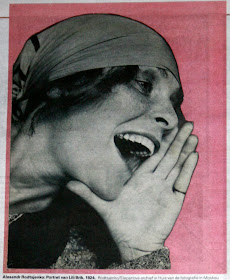
Foam_Fotografiemuseum Amsterdam presents a unique retrospective of the world-famous Russian avant-garde artist Alexander Rodchenko. The exhibition will contain more then 200 vintage photographs some of which have never been exhibited in the West before. Alexander Rodchenko (1891-1956) is one of the great innovators of twentieth-century avant-garde art and one of its most versatile practitioners. Having first gained international acclaim as a painter, sculptor and graphic designer, Rodchenko took up the practice of photography in the early 1920s, convinced that it would become the artistic medium of his era. Over the course of the following two decades he developed a bold new vocabulary of acute camera angles, extreme foreshortenings of perspective and close-ups of surprising details. In addition to introducing design as an integral element of photography, Rodchenko’s approach balanced formal concerns with an interest in documenting the social and political life of the Soviet Union. In the process, he helped to change the way people perceived not only photography, but also the role of the photographer.
Tracking the development of his photographic work over the course of two decades, Revolution in Photography reveals the artist’s talent for experimentation as well as the extraordinary range of his work. From sharp-witted photomontage to documentary reportage in Moscow’s streets, from dynamic architectural studies to intimate portraits of his circle, Rodchenko’s photographic activity possessed a breath and scope matched by few artists of his day. Abandoning ‘pure’ art in favour of developing a visual language that could address a mass audience, Rodchenko applied himself as a photographer and designer to the production of posters, magazine and book design, advertisements for state-owned enterprises as well as photojournalism and other forms of documentary photography.
In presenting a comprehensive selection of his work, this exhibition offers a significant opportunity to re-evaluate Rodchenko’s achievements in photography as well as to reconsider the fertile and tumultuous moment in which he worked – a period that extended from the intellectually adventurous Lenin years to the repressive cultural regime initiated by Stalin. It also allows us to appreciate how fresh and daring his work still is today. Indeed, though more than half a century has passed since his death, his many significant accomplishments continue to influence a wide range of contemporary practitioners.
The exhibition Revolution in Photography is made in collaboration with the Moscow House of Photography.




Geen opmerkingen:
Een reactie posten